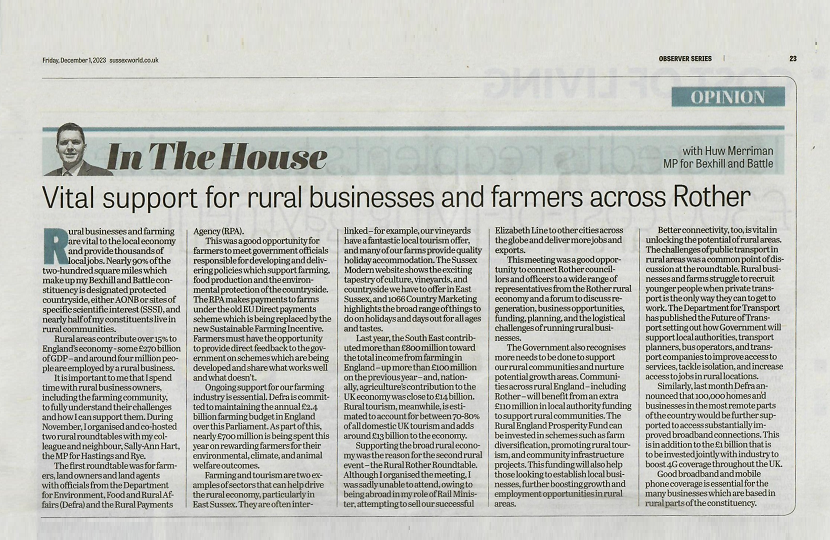
Rural businesses and farming are vital to the local economy and provide thousands of local jobs. Nearly 90% of the two-hundred square miles which make up my Bexhill and Battle constituency is designated protected countryside, either AONB or sites of specific scientific interest (SSSI), and nearly half of my constituents live in rural communities.
Rural areas contribute over 15% to England’s economy - some £270 billion of GDP – and around four million people are employed by a rural business.
It is important to me that I spend time with rural business owners, including the farming community, to fully understand their challenges and how I can support them. During November, I organised and co-hosted two rural roundtables with my colleague and neighbour, Sally-Ann Hart, the MP for Hastings and Rye.
The first roundtable was for farmers, land owners and land agents with officials from the Department for Environment, Food and Rural Affairs (Defra) and the Rural Payments Agency (RPA).
This was a good opportunity for farmers to meet government officials responsible for developing and delivering policies which support farming, food production and the environmental protection of the countryside. The RPA makes payments to farms under the old EU Direct payments scheme which is being replaced by the new Sustainable Farming Incentive. Farmers must have the opportunity to provide direct feedback to the government on schemes which are being developed and share what works well and what doesn’t.
Ongoing support for our farming industry is essential. Defra is committed to maintaining the annual £2.4 billion farming budget in England over this Parliament. As part of this, nearly £700 million is being spent this year on rewarding farmers for their environmental, climate, and animal welfare outcomes.
Farming and tourism are two examples of sectors that can help drive the rural economy, particularly in East Sussex. They are often interlinked – for example, our vineyards have a fantastic local tourism offer, and many of our farms provide quality holiday accommodation. The Sussex Modern website shows the exciting tapestry of culture, vineyards, and countryside we have to offer in East Sussex, and 1066 Country Marketing highlights the broad range of things to do on holidays and days out for all ages and tastes.
Last year, the South East contributed more than £800 million toward the total income from farming in England – up more than £100 million on the previous year – and, nationally, agriculture’s contribution to the UK economy was close to £14 billion. Rural tourism, meanwhile, is estimated to account for between 70-80% of all domestic UK tourism and adds around £13 billion to the economy.
Supporting the broad rural economy was the reason for the second rural event – the Rural Rother Roundtable. Although I organised the meeting, I was sadly unable to attend, owing to being abroad in my role of Rail Minister, attempting to sell our successful Elizabeth Line to other cities across the globe and deliver more jobs and exports. This meeting was a good opportunity to connect Rother councillors and officers to a wide range of representatives from the Rother rural economy and a forum to discuss regeneration, business opportunities, funding, planning, and the logistical challenges of running rural businesses.
It was encouraging to hear participants’ feedback that, since our first Rother Rural Roundtable in June 2022, Rother is now considered a council which proactively supports appropriate and sympathetic development to allow for sustainable economic growth in rural communities.
The Government also recognises more needs to be done to support our rural communities and nurture potential growth areas. Communities across rural England – including Rother – will benefit from an extra £110 million in local authority funding to support rural communities. The Rural England Prosperity Fund can be invested in schemes such as farm diversification, promoting rural tourism, and community infrastructure projects. This funding will also help those looking to establish local businesses, further boosting growth and employment opportunities in rural areas.
Better connectivity, too, is vital in unlocking the potential of rural areas. The challenges of public transport in rural areas was a common point of discussion at the roundtable. Rural businesses and farms struggle to recruit younger people when private transport is the only way they can to get to work. The Department for Transport has published the Future of Transport setting out how Government will support local authorities, transport planners, bus operators, and transport companies to improve access to services, tackle isolation, and increase access to jobs in rural locations.
Similarly, last month Defra announced that 100,000 homes and businesses in the most remote parts of the country would be further supported to access substantially improved broadband connections. This is in addition to the £1 billion that is to be invested jointly with industry to boost 4G coverage throughout the UK. Good broadband and mobile phone coverage is essential for the many businesses which are based in rural parts of the constituency.



